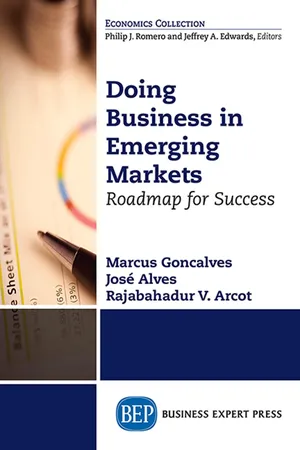![]()
CHAPTER 1
Entering an Emerging Market
Overview
Entering an emerging market is not easy. In our experience in teaching this topic, consulting for several multinational corporations around the world, and being a practitioner ourselves, we find that emerging markets are tough to enter. Government interference, backward infrastructure, and a lack of skilled workers require a lot of patience, perseverance, and specialized assistance. Opportunities in the emerging markets come with their own set of challenges. For instance, often lack of education of the workforce translates into thwarted growth being curbed by a lack of a skilled workforce. Other challenges that arise are legal frameworks with regard to trade policies, which may be absent or underdeveloped, or tendencies for political paternalism or blatant interferences, which we see in India and Latin America.
Compare the above to the advanced economies, which, despite the fact that growth has been flat to negative since 2008, continues to supersede emerging markets. When looking at the EU, the 27-member countries allow for labor mobility and a free flow of goods without tariff or nontariff restrictions. Furthermore, the workers in many EU countries are highly educated and have conferred great reputations for their economies. “German engineering” is well known around the world for its high level of quality, the same cannot be said for Indian or Russian engineering.
India has been making progress in opening its economy, but its political response to a much-needed foreign investment is troubling. Large foreign retailers such as IKEA are willing to employ thousands of Indians, but politicians continue to fret about mom-and-pop stores and other small businesses that may be displaced. In 2012, politicians forbade IKEA from selling half its product line in India. In 2012, the deputy chief minister for Punjab went as far as to declare that there was no need for foreign-owned discount retail chains because there are already a multitude of stores selling cheap goods.1
Foreign investors become confused and frustrated with these types of patriarchal decisions such as these. Although many nations have transitioned from autocratic rule to democracies with free markets, some continue to dabble in market interference. Take Argentina as an example, where President Cristina Fernández de Kirchner, to prevent a run on the peso by Argentines, has put strict currency controls in place. It is not wonder that in an annual World Bank study titled Doing Business (2013), New Zealand, Singapore, and Hong Kong ranked first, second, and third place respectively in protecting investors, while Argentina ranks 98.2
Emerging markets such as India and China have huge and growing populations and thus demand rapid growth rate if they are to make any headway in social development. If India’s economic growth falls below six percent the nation would be in crisis, whereas in most advanced economies, such as the United States, if the economy grew at that rate it would risk overheating.
India can barely keep up with educating its rising populations. It needs as many as 1,000 new universities and 35,000 new colleges if it is to achieve its stated goal of raising post-secondary enrollment from 12 percent today to 30 percent by 2020. Meanwhile, Mexico is turning out more engineers and engineering technicians a year than Germany, and it must scramble to ensure they all get jobs. To fail would be to spawn social unrest.
Another key factor when considering entering emerging markets is the distance between emerging markets, which can hamper trade. One study found that a 10 percent increase in distance between north-to-north traders reduces trade by 10 percent; the same distance between south-to-south traders reduces trade by 17 percent.3
An improved policy would make an important difference in resolving such problems but emerging market have yet to demonstrate serious desires for true bilateral cooperation. Although the ASEAN nations have a trade agreement, it has yet to yield much economic improvement, as the bloc has yet to turn their loose organization into a trading block, even though economic integration has been touted as a central pillar.
Public administration in emerging markets has much to be desired. The 2013 Doing Business4 study by the World Bank ranks Brazil, Russia, India, China, and South Africa (BRICS) as 116th, 92nd, 134th, 96th, and 41th respectively out of 189 countries.
Infrastructure remains a significant problem in most emerging markets. China continues to invest heavily in roads, railways, and ports, but elsewhere the progress is weak. India has called for $1 trillion in infrastructure modernization but it lacks the funds to do so independently and its politicians remain suspicious of external sources of capital. The situation is no different in Latin America, in fact, it is arguably worse, as 80 percent of Latin Americans live in cities, compared to fewer than half of Asians. T...
